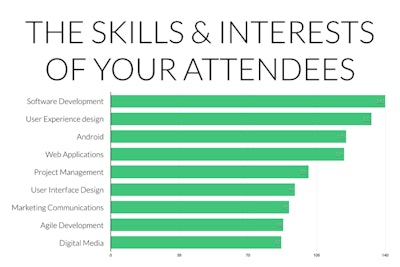
Tim Groot (@Tim_Grand) is the C.E.O. of Networkr, a professional networking application that aims to make networking more effective by establishing dialogues between professionals based on a mutual interest.
More than 90 percent of all event organizers find gathering more information on their attendees important, according to a recent report from IML Worldwide. But understanding that these so-called “insights” are important is only the first step. The next step is to decide what is actually important data and how can it can be used to increase the R.O.I. of your event. Together with managers from Reed Exhibitions, TEDx KEA, and several other event stakeholders, I believe we have found three ways those attendee insights can help to increase the return on investment.
1. Deciding What Speakers to Attract
Spending a large amount of money on attracting a high-profile speaker is often partly a gamble. How do you know that the speaker is what your attendees are interested in? To make data-enabled decisions on what speakers to attract, you need more than just the “industry” of the attendee and their “seniority” level. It’s important to know specific interests of the attendees.
For example, when your attendees are mainly managers in the advertising industry and a large percentage of them have social media marketing as a skill, there is a good chance that they are interested in hearing about how they can use a new social media platform, such as Snapchat, in their campaigns.
2. Where and How to Promote Your Event
Department store magnate John Wanamaker famously once said, “Half my advertising is wasted; I just don't know which half.” This is not only true for retail, but also true when you are promoting your event. With the increasing importance of social media as part of an ad campaign, knowing exactly who to target has become key to the success of advertising.
The possibilities for targeting your Facebook, Twitter, LinkedIn, and Google campaigns towards specific users are endless. Knowing what characteristics your existing attendees have can help you in deciding where to spend your marketing budget. Carefully analyzing your existing audience on social media in combination with the attendees of your event can help you maximize the R.O.I. on your promotional efforts.
3. Attracting More Sponsors
When talking to event organizers in order to decide what insights they were looking for and how they could use them, the main reason was in order to attract sponsors. One organizer clearly expressed the importance of insights in one sentence when pitching his event to potential sponsors. Imagine being able to pitch your event in the following way to a development agency: “Thirty percent of my attendees are decision makers in the marketing and advertising industry, and are interested in software development. Would you like to reach these decision makers by sponsoring my event?”
Being able to identify such a specific opportunity for sponsors at your event will attract more sponsors and will make it possible to ask for more money. It combines different levels of insights in order to arrive at a specific target group that can be reached by sponsoring your event. It’s much better than the usual “150 of my attendees are C.M.O.s,” which doesn’t have the same detail. It is much more important to know what these chief marketing officers are actually interested in.
How to Collect Insights
If you want to start improving your R.O.I. with insights, I would start by simply looking at who your audience is on social media. If you want to go a step further and are using a mobile event app, you can see they often collect some insights that you can use. When attendees start joining your event with their LinkedIn profile, you can begin to go more in-depth into what their position is at the company, their experience in years, and the most insightful: what skills they have. This is because the areas that attendees are skilled in are often a good indication of what they are also interested in on a much deeper level.
Collecting such information means that there has to be a reason for attendees to join your event with their LinkedIn credentials. I personally think that it is extremely difficult to get attendees to join every event app they use with their LinkedIn profile. That is why I think interesting companies to look at are Bizzabo, Conferize, and my own startup, Networkr. Although we all have a different focus, for all of us insights are part of the value proposition to event organizers. Instead of professionals having to join every event with their LinkedIn credentials they only have to join the platform once and can simply join individual events.
Disclaimer: The views and opinions in this article belong to the author, and do not necessarily represent those of BizBash.



















